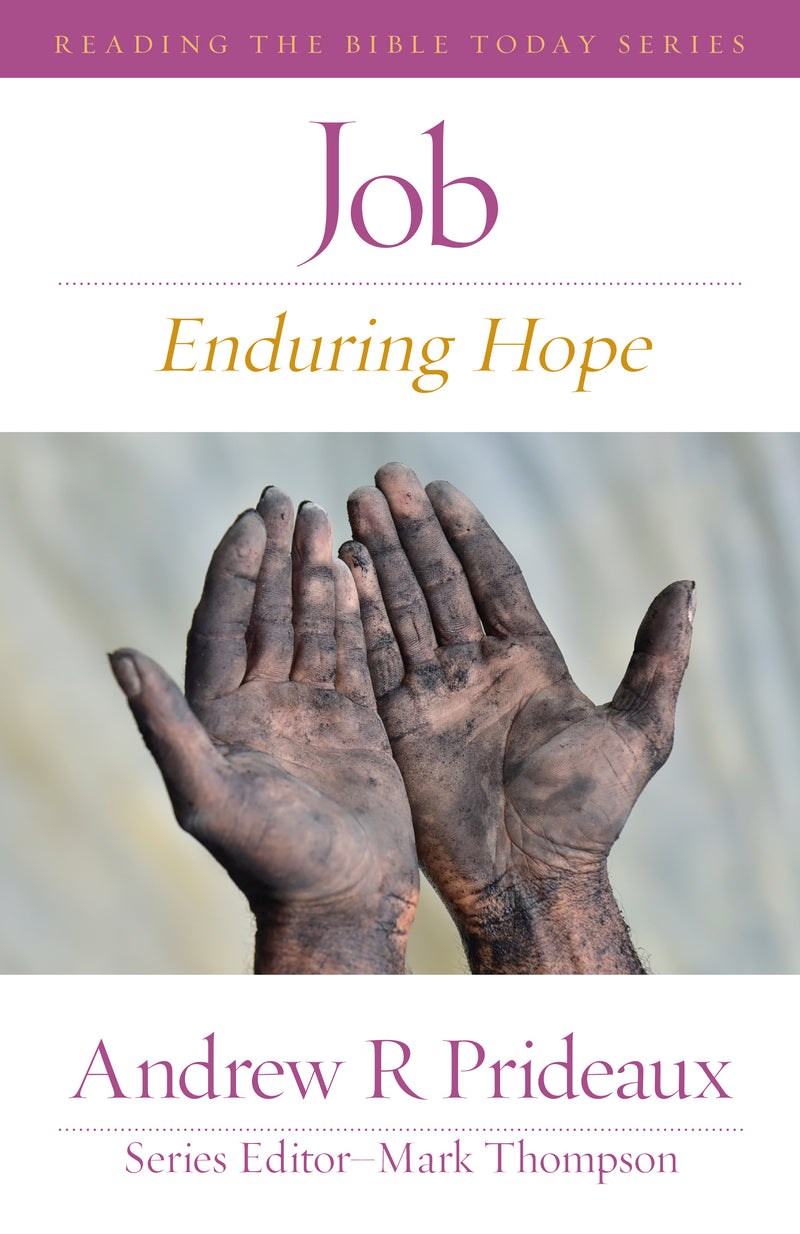
When we are weak: lessons for parents from the book of Job
Encouragement from Andrew Prideaux, author of ‘Job: Enduring Hope’.
Sometimes I find myself waiting for the calm waters, for my life to get easier, and for me to have less struggles in my faith. I keep hoping my ministry will get easier, and for my family to be free of struggles. That is, for everything to fall neatly into place. Then, I tell myself, I’ll catch a break and really kick some goals. I’ll finally catch up with people around me who appear to be striding ahead in life, while I seem to be limping. When this happens, I think, I’ll enjoy God more and do great things for him.
Part of my ongoing mid-life crisis has been the growing realisation that actually, God is committed to showing his strength, his grace, his goodness and his self-sufficiency through, not in spite of my helplessness and weakness (2 Corinthians 12:7–10). But it’s one thing to know this scriptural truth, and another thing to live by it.
A family decimated
The book of Job tells the story of a man in relationship with his Creator, who for most of the book finds this relationship fraught with pain and confusion. But it is also the story of a family that goes from ‘riches to rags’. Job, his wife, their seven sons and three daughters have it all: health, wealth and wisdom (1:1–5; cf. 29:1–25). But in one devastating moment, they lose everything. Each one of their children dies in a horrific accident (1:18–19), and Job is afflicted with a painful and debilitating skin disease that leaves him in a state of living death (2:7–8; cf.7:5; 13:28; 30:17, 30). Over time this disease will also take its toll on what we would now call his mental health.
They are never told ‘why’
We as readers know that God is in complete control of Job’s situation and has a 'happy ending' planned. It was the Lord who first invited Satan to ‘consider Job’ (1:8; 2:3), and while Satan is the agent of Job’s suffering, he can only do what God allows him to do (1:7, 12; 2:2, 6). While Satan’s goal is to undermine or even destroy the relationship between the Lord and his servant (1:6, 11; 2:4–5), it is the Lord’s sovereign purpose for Job which will alone prevail. Before angelic beings in the heavens, the Lord celebrates Job’s faith (‘fear of the Lord’) and obedience (Job 1:6–12; 2:1–8). The Lord is in no doubt about Job and seems to be using this suffering to prove the genuine worth of Job’s faith (see 1 Peter 1:6–7).
However, neither Job and his wife, nor his friends who come to comfort him (2:11–13), have any idea what is going on ‘in the heavens’, or why God has allowed ‘this evil’ to occur to them on earth (42:11). Indeed, they are never told.
This is of course true to life. We are not told in advance, or moment by moment why each detail in our lives unfolds in the way that it does. We have the big picture: God is our maker and our Saviour. He is good and he works out his good purposes for us, even through our suffering (e.g. Romans 8:12–30). But in the meantime, life is often difficult and disappointing—sometimes for a very long time.
Marriage under pressure
For Job’s wife, all of the suffering she and her husband are experiencing is still very raw. She speaks words that unwittingly echo those of Satan (2:9–10): ‘Do you still hold fast your integrity? Curse God and die’. (2:9 cf. 1:11; 2:5) Job recognises the foolishness of her words, and he is right to do so. However, she is speaking out of extreme pain, as Job will do later. She stays married to Job, despite the fact that Job’s ongoing suffering has put a great strain on their marriage (19:10).
Life in suffering is messy and complicated and can seem strange to people around us who look on. Job’s friends, who at least start by coming to comfort him (2:11–13), only intensify his pain and his feeling that God may have abandoned him, when they wrongly view his suffering as the fruit of his rebellion against God. How hard it must have been for Job’s wife to listen to these three ‘wise men’, as they denigrated the reputation of her husband, and falsely blamed him for the death of their children!
We also know that when God restores and blesses Job in the end, he blesses Job’s wife also. While the pain of their original loss remains and is finally recognised by friends and family (42:11), God once again blesses them with more children (42:10–17).
Trusting God in the dark
When we go through hard times, especially if they last for a long period, it can be easy to compare ourselves with others around us, and feel like we are ‘losing’, or ‘missing out’. Perhaps we aren’t able to do what we used to do or what we want to do. The book of Job shows us that it is OK to feel these things, and that other brothers and sisters experience similar things.
The book also shows us what to do with our doubts and frustrations: to cry out, sometimes even scream out to God. It is an interesting statistic that in the Bible’s ‘prayer book’ (the Psalter), over a third of the psalms are songs of lament. There are other hymns of lament we can pray like Christina Georgina Rosetti’s ‘None other lamb’. When Job lamented and complained to God, he cried out to the right person—the sovereign ruler of the universe, now revealed through Christ as our loving heavenly Father! By contrast, the friends say a lot of things about God, but never once do we hear them talk to God, let alone pray for their friend.
God is in control, and he wants us to lean hard into him. This is one of the reasons why Job’s speeches were commended by God, while the friends were condemned (42:7–8). While the friends were prayer-less, Job was constantly at prayer. Don Carson writes:
‘Job wrestles with God, he is indignant with God, he challenges God to come before him and provide some answers; but all his struggles are the struggles of a believer.’
God is the perfect Father who wastes nothing in his great purpose to make his children like his Son Jesus (see 1 John 3:1–3; Romans 8:18–30). In the loving hands of our heavenly Father, the struggles and pain and disappointments of our lives are not a waste of our time or our potential, but are caught up into God’s good and positive purpose. For much of Job’s life, it felt to him like he was slowly and painfully wasting away towards death (for example, his reflections in chapter 7). But in actual fact, as he kept crying out to God in his confusion; as he just ‘hung in there’ by his pinky toe, he was realising God’s good purpose for his life. It was impossible for him to imagine that centuries later he would be held up as an example for us to follow:
‘As you know, we count as blessed those who have persevered. You have heard of Job’s perseverance and have seen what the Lord finally brought about. The Lord is full of compassion and mercy.’ (James 5:11)
God is good, and one day he will be seen to be good and known to be good by all of his children. The God who revealed himself as the Creator and sustainer of all that is (38:1–41:34), is the God who showed compassion and mercy to Job.
God’s last word is blessing
God used suffering to prove Job’s faith. But it was not suffering that had the last word, but rather blessing. The happy ending of Job forms one of the Old Testament anticipations of the happy ending in the ‘new heavens and the new earth’. This is not a naïve or silly hope, but a gutsy one guaranteed by Jesus Christ, who suffered and died on the cross for our forgiveness and rose again as our all-conquering Lord—guaranteeing the glorious future of this world and of God’s people who will dwell in it with him forever (1 Peter 1:3).
Right now, in our families there are tears, there is confusion and there is pain. But Jesus, who sits at God’s right hand, also sits with us through his Spirit and groans and weeps with us (Romans 8:26; cf. Acts 9:1–6; Hebrews 4:14–5:10). The way to our heavenly city includes many trials, but all of God’s children will make it through its gates, even if only ‘by the skin of our teeth’ (Job 19:20). The Lord Jesus says to us, ‘Surely I am coming soon’ (Revelation 22:20a). As Job cried out for the Lord to come, so we can cry, ‘Come Lord Jesus’(Revelation 22:20b).
---
Andrew Prideaux is a senior staff worker at the University of Melbourne with Christian Union International and the Simeon Network (AFES) and the author of a new commentary, Job: Enduring Hope. Andrew is married to Vannessa, and they have four children.

Job: Enduring Hope
This insightful exploration of the book of Job by Andrew R Prideaux combines deep theological insight with practical application, resulting in a commentary truly useful for preaching, teaching and pastoral care.
For more articles from Growing Faith, subscribe to our monthly e-newsletter.
To hear about the latest books and resources from Youthworks Media, subscribe here.








